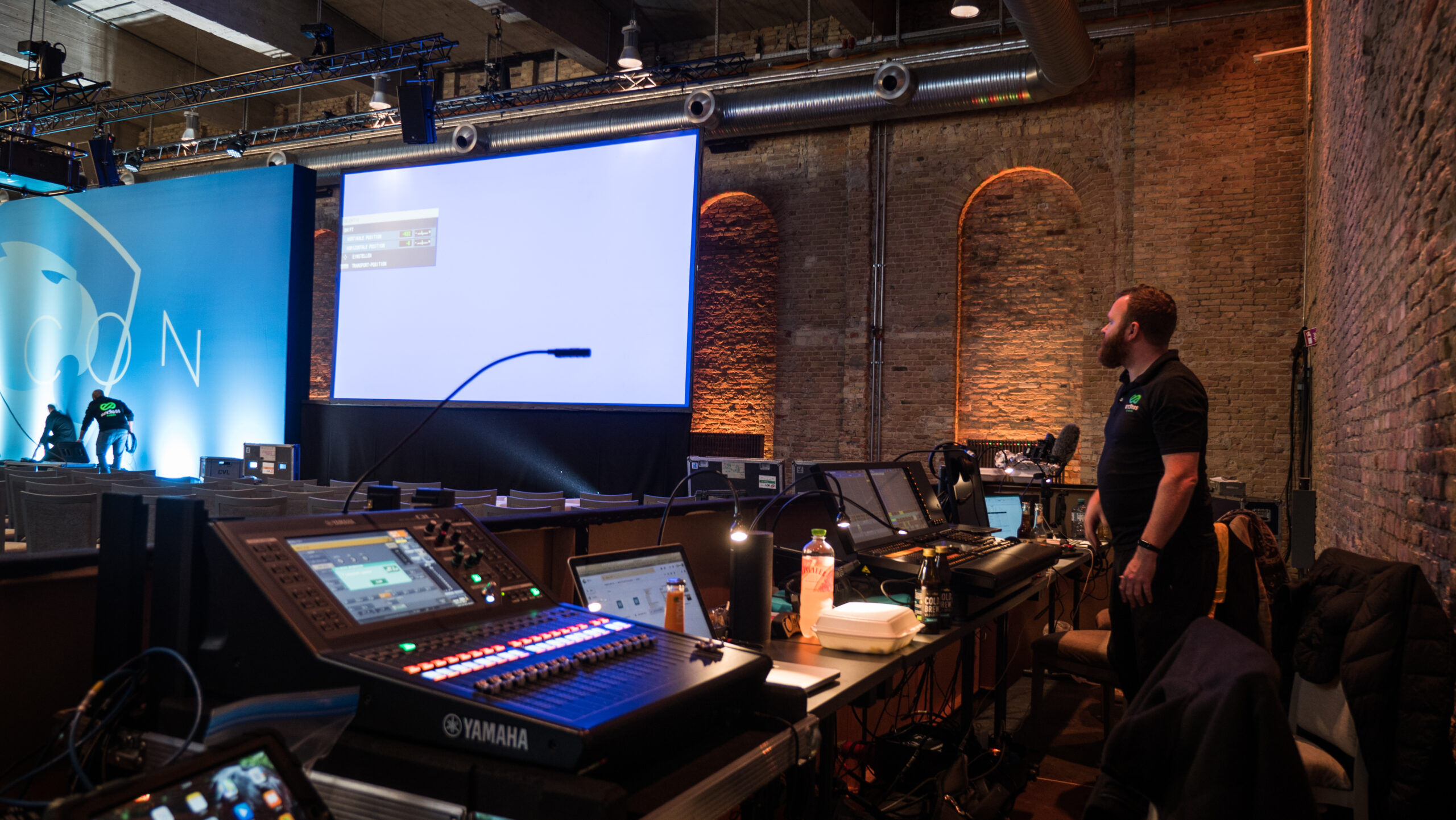How Event Production Functions: A Comprehensive Consider the Process
Event production is a facility and organized procedure that requires careful preparation and implementation. It begins with establishing clear goals and comprehending the target audience. Each action, from budgeting to location choice, plays a critical duty in guaranteeing success. As the process unfolds, different components need to line up perfectly. Yet, the nuances of this elaborate procedure usually go undetected. What are the key phases that add to an unforgettable event?

The First Planning Stage
When starting on event production, careful planning is vital to assure a successful result. The preliminary drawing board serves as the foundation for all subsequent efforts. During this phase, event manufacturers must specify the event's objective and purposes plainly. Determining the target audience helps tailor the experience and messaging, assuring relevance and engagement.Producers must likewise think about the event style, whether it be in-person, online, or hybrid, as this will affect various logistical aspects. Choosing a suitable date and place is essential, as it influences access and availability.Furthermore, constructing a reliable group is basic for separating obligations and improving communication. Establishing a timeline with milestones warranties all jobs are completed on schedule. This phase entails detailed research study, including identifying possible challenges and devising methods to reduce risks. Inevitably, a well-structured preliminary planning stage sets the tone for an effective event production journey.

Budgeting and Resource Appropriation
In event production, efficient budgeting and source allotment are essential for success - event production charlotte. Establishing economic specifications establishes the foundation for all succeeding decisions, while source distribution methods assure that every element of the event is appropriately sustained. Together, these aspects help preserve control over expenses and optimize using available sources
Developing Financial Parameters
Establishing monetary criteria is vital to the success of any type of event production, as it establishes the structure for effective budgeting and source appropriation. This process begins with defining the overall budget plan, which incorporates all facets of the event, including location prices, catering, and marketing. By determining readily available funds, event organizers can prioritize expenditures and allot resources appropriately. On top of that, it is necessary to conduct extensive marketing research to prepare for potential expenses and identify funding sources, such as sponsorships or ticket sales. Establishing clear monetary specifications likewise aids in threat management, allowing coordinators to reserve contingency funds for unexpected expenses. Ultimately, a well-defined budget serves as a roadmap, directing the event production team towards achieving their goals while keeping economic control.
Source Circulation Methods
Reliable source distribution strategies are essential for making the most of the effect of an event while sticking to budget plan restraints. Successful event production needs a meticulous approach to budgeting and source allowance. Coordinators should prioritize essential components such as place, food catering, and innovation, ensuring that funds are allocated to locations that improve attendee experience. A detailed spending plan must describe anticipated expenses and determine areas for possible expense savings, such as bargaining with vendors or exploring sponsorship possibilities. Furthermore, tracking expenses throughout the planning procedure assists prevent overspending. By utilizing tactical source distribution, event manufacturers can deliver a remarkable experience while preserving monetary obligation, ultimately adding to the overall success of the event.
Location Selection and Logistics
Selecting the right location is necessary to the success of any type of event, as it sets the stage for the total experience. Venue option involves examining various aspects, consisting of capacity, access, and location. Coordinators must think about the target market and the nature of the event, ensuring the location lines up with the event's goals.Logistics play a substantial role in this process, entailing arrangements for seating, audiovisual devices, and providing services. A well-chosen location needs to facilitate smooth flow for participants and staff, improving engagement.Additionally, assessing potential venues for services like car parking, washrooms, and fire escape is essential for safety and benefit. The timeline for protecting the location is likewise critical, as popular places might book quickly - event production charlotte. As a result, complete preparation and prompt implementation can eventually add to a smooth event experience, making location choice and logistics essential elements of successful event production
Imaginative Idea Development
While the place sets the physical phase, innovative principle growth shapes the event's identity and story. This procedure begins with determining the event's purpose and target audience, allowing event manufacturers to develop a compelling theme that reverberates with guests. Brainstorming sessions frequently include varied viewpoints, promoting ingenious concepts that line up with the event's goals.Once a style is established, aesthetic components such as shade combinations, signs, and decoration are developed to enhance the total environment. Storytelling methods may additionally be integrated to create an interesting journey for individuals, ensuring a memorable experience. In addition, considerations regarding entertainment, tasks, and interactive components are straightened with the selected idea, reinforcing the style throughout the event.Ultimately, effective innovative principle development warranties that every aspect of the event functions cohesively, leaving an enduring impression on participants and fulfilling the event's goals. This foundational work prepares for subsequent preparation and execution phases.
Teaming up With Vendors and Distributors
Successful event find production depends upon reliable collaboration with suppliers and distributors. Selecting trusted partners, discussing agreements efficiently, and making sure prompt shipments are critical steps in this procedure. Each of these factors contributes substantially to the overall success and smooth execution of an event.
Choosing Reliable Allies
How can event coordinators ensure a seamless production experience? Selecting reputable companions is crucial in achieving this goal. Event planners need to perform thorough research to recognize suppliers and vendors with a tried and tested record of excellence. This includes checking recommendations, reviewing portfolios, and reviewing customer responses. Planners must focus on partners that show professionalism, timely communication, and a willingness to work together. Building strong relationships fosters trust and makes it possible for fast analytical during the event. In addition, it is beneficial to pick neighborhood vendors who understand the place and local logistics. Eventually, an effective event rests on the synergy in between planners and their companions, making certain that every facet of production runs smoothly and efficiently.
Negotiating Agreements Properly
Efficient negotiation of agreements is a crucial step in the collaboration in between event organizers and their suppliers and vendors. This process entails clear interaction of assumptions, deliverables, and timelines. Planners need to carry out extensive research on market prices and industry criteria to establish a standard for settlements. It is essential to develop a collective ambience, motivating open discussion about terms, prices, and potential backups. Planners need to also focus on understanding the supplier's capabilities and constraints to straighten their requirements effectively. Adaptability can lead to equally advantageous agreements, cultivating lasting relationships. Crafting distinct contracts that consist of details performance metrics can assist assure responsibility, ultimately resulting in effective event implementation and complete satisfaction for all events involved.
Guaranteeing Timely Shipments
Timely shipments are essential for the smooth execution of any type of event, calling for persistent partnership in between organizers and their vendors and providers. Efficient interaction is essential, as it helps establish clear expectations relating to distribution timetables, amounts, and specific requirements. Coordinators commonly develop detailed timelines to outline vital turning points, making sure all events continue to be straightened throughout the procedure. Normal check-ins with suppliers can aid identify potential hold-ups early, permitting positive remedies. In addition, constructing strong connections with trustworthy vendors promotes depend on and accountability, which can result in far better solution and prioritization. By prioritizing these collective initiatives, coordinators can lessen interruptions, thus enhancing the overall performance of event production and making certain that all needed products and services arrive as intended.
Advertising And Marketing and Promo Techniques
While organizing an event, the success of advertising and marketing and promotion approaches can considerably affect participation and involvement. Efficient strategies usually include a mix of digital advertising, conventional marketing, and grassroots outreach. Making use of social networks platforms enables real-time communication and targeted advertising, reaching details demographics successfully. Email advertising and marketing campaigns can better involve prospective guests with personalized material and reminders.Collaborations with influencers or sector leaders can also home improve reliability and broaden reach. Developing engaging material, such as video clips or blog sites, helps to produce buzz and receive interest leading up to the event. Furthermore, leveraging early-bird price cuts and exclusive benefits can incentivize ticket purchases.Promoting through standard networks, such as posters or neighborhood media, remains appropriate, particularly in community-focused occasions. A thorough method that incorporates numerous approaches guarantees optimum exposure and involvement, ultimately adding to the event's success and the creation of a memorable experience for attendees.
On-Site Execution and Administration
On-site execution and management are crucial components that determine the overall success of an event. Effective coordination during the event guarantees that all elements align with the prepared schedule. Event managers supervise logistics, including vendor coordination, equipment setup, and guest services. Checking timelines and addressing any type of unanticipated issues are fundamental for maintaining a smooth experience.The personnel plays a considerable function, as qualified personnel are in charge of various jobs such as enrollment, info dissemination, and technical assistance. Interaction among team participants is essential; it promotes a collective environment and makes it possible for fast resolution of challenges.Additionally, safety protocols have to be complied with, securing the wellness of all guests. Post-event assessments are also component of on-site administration, providing understandings for future enhancements. By concentrating on these elements, event producers can develop unforgettable experiences that satisfy or go beyond participant expectations while accomplishing the event's objectives.
Regularly Asked Concerns
Just how Do I Select the Right Event Theme?
Choosing the appropriate event style involves considering the target market, event purpose, and location. Researching present trends and gathering Find Out More input from stakeholders can additionally influence creative concepts that reverberate and create a remarkable experience.

What Are Common Mistakes in Event Production?
Common mistakes in event production commonly include insufficient preparation, bad communication among staff member, budget plan mismanagement, neglecting to consider the target market's requirements, and stopping working to conduct an extensive post-event assessment for future improvements.
Just How Can I Determine Event Success?
To measure event success, one can analyze participant fulfillment, interaction degrees, spending plan adherence, and post-event comments. Key efficiency indicators, such as ticket sales and social media sites communications, also give useful insights right into overall effectiveness.
What Should I Do if It Moistens the Event Day?
In case of moisten the day, the organizer needs to execute backup plans, such as safeguarding camping tents or relocating activities indoors. Communication with participants concerning changes is important to ensure a smooth experience despite weather condition challenges.
Exactly How Can I Ensure Guest Interaction During the Event?
